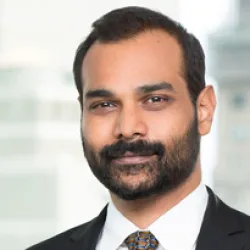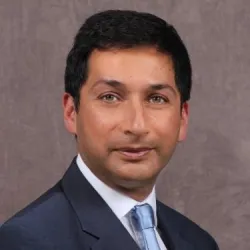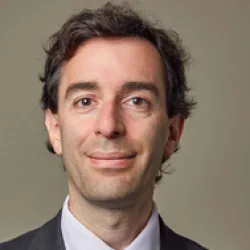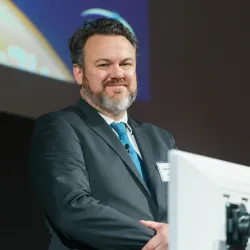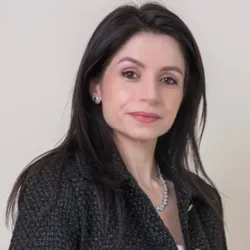Agenda
Agenda

Risk Live Europe agenda
The Risk Live Europe agenda showcases world-class speakers and industry leaders sharing critical insights on the trends affecting the market this year
Plenary sessions
08:00 – 08:45
Registration and refreshments
08:00 - 09:00
08:15 – 08:45
Risk.net editorial presentation
Subscriber briefing
08:15 - 08:45
Kris Devasabai is the editor-in-chief for Risk.net. Previously, he was bureau head, US of Risk magazine and now he manages the editorial teams in APAC, EU and US. Prior to joining Risk, he covered hedge funds, asset management, cross-border investing and law for several publications. Kris holds a bachelor’s degree in law and government from the University of Manchester, and he completed his legal training at the Inns of Court School of Law in London. He was called to the bar of England and Wales in 2003.
08:45 – 09:10
Welcome to Risk Live Europe 2024
09:00 - 09:10
Duncan Wood is the London-based editor-in-chief of Risk.net. He was promoted to the role at the start of 2015, to lead the editorial reorganisation of the website and its print titles. Wood had been editor of Risk magazine since July 2011. He rejoined Risk as European editor in October 2009, having originally worked for Risk and Asia Risk in London and Hong Kong as a writer and researcher between 1998 and 2000.
In the intervening years, Wood was news editor for the Oliver Wyman-founded online start-up ERisk.com. He also worked freelance for six years while living in Germany, with his work featuring in Euromoney, Financial News, IFR, and The Wall Street Journal, as well as Risk magazine and its sister titles. Wood has written about derivatives and risk throughout his 17-year career in journalism. He is a Neal Awards finalist, and has won Incisive Media's journalist and editor of the year awards.
09:10 – 09:45
Opening keynote: Rory Stewart, Former Secretary of State, UK Government
Keynote address
09:10 - 09:30
Today’s geopolitical picture is complex. This opening keynote aims to demystify the current impact of global political trends, as well as looking at what might happen in the next decade and beyond. With the interconnected nature of these risks, and their impact on markets worldwide, the financial services industry needs to be prepared for potential fall out, but also is well placed to collaborate and co-ordinate efforts which might mitigate some of these risks and promote sustainable economic growth.
Rory Stewart is a diplomat, author, explorer, academic, and politician – serving in successive Conservative governments as minister of state for international development, minister for environment, minister of state for Africa, and minister of state for prisons. He is a senior fellow at Yale University’s Jackson Institute for Global Affairs, where he teaches politics and international relations.
Stewart is an acclaimed author and co-host of the successful podcast, The Rest is Politics, alongside Alastair Campbell. He has been described by the New York Times as “living one of the most remarkable lives on record.”. Stewart was the first man to walk across Afghanistan after the US-UK invasion, and served as deputy governor of two Iraqi provinces at the age of 29. He advised the US President and British Prime Minister on their Afghanistan and Middle East policy. Stewart is proficient in 11 languages.
09:45 – 10:30
Geopolitical unrest and black swan events
Panel discussion
10:00 - 10:45
- How can organisations build broad, strategic resilience to prepare for and adapt to unexpected events?
- Long-term macroeconomic trends – including inflation, globalisation and demographic shifts – to inform proactive risk management
- The interplay between political outcomes, economic policies, global trade and evolving environmental, social and governance (ESG) regulation
Kanwardeep Ahluwalia is co-head of global markets risk for Bank of America. He joined Bank of America from Swiss Re where he was the group head of financial risk management, which included the role of chief risk officer for asset management, as well as serving as the reinsurance chief risk officer for Emea. Prior to that, Ahluwalia worked at Bear Stearns where he had a number of positions leading to the roles of chief risk officer for Europe & Asia and global head of market risk. This was preceded by a period working in regulation for the UK’s former Securities & Futures Authority.
Duncan Wood is the London-based editor-in-chief of Risk.net. He was promoted to the role at the start of 2015, to lead the editorial reorganisation of the website and its print titles. Wood had been editor of Risk magazine since July 2011. He rejoined Risk as European editor in October 2009, having originally worked for Risk and Asia Risk in London and Hong Kong as a writer and researcher between 1998 and 2000.
In the intervening years, Wood was news editor for the Oliver Wyman-founded online start-up ERisk.com. He also worked freelance for six years while living in Germany, with his work featuring in Euromoney, Financial News, IFR, and The Wall Street Journal, as well as Risk magazine and its sister titles. Wood has written about derivatives and risk throughout his 17-year career in journalism. He is a Neal Awards finalist, and has won Incisive Media's journalist and editor of the year awards.
In 2016 William Cooper became the head of risk for SEB Denmark with responsibility for protecting the banks financial results and reputation by preventing excessive risk taking and promoting a strong risk management culture. He has a key role in driving and contributing to risk related projects including the banks FRTB program.
Cooper has worked in the past for both buy and sell side firms, in roles ranging from trading at a large hedge fund to working as a quantitative analyst at a tier 1 investment bank, always with a focus on improving financial modelling and analytics to maximize risk management and market awareness. He holds a BSc in mathematics and economics from the LSE and a MSc in mathematics from the University of Copenhagen.
10:30 – 11:05
Morning networking break
10:45 - 11:10
Ask the expert: Mastering default risk prediction
A chance to dive into the detail with our topic expert.
10:35 - 10:55
The financial industry is facing unprecedented challenges in predicting default rates, exacerbated by recent events like the Credit Suisse crisis. With limited resources for monitoring and surveillance, managing counterparty and credit risk has become increasingly complex. How can organisations effectively leverage data to forecast default rates and mitigate risk in their portfolios?
Don’t miss the opportunity to pit your questions to our expert and uncover:
- Practical methods for predicting default rates using consensus credit ratings data.
- Strategies for managing counterparty risk in a post-Credit Suisse landscape.
- Insights into leveraging predictive analytics for effective portfolio management.
Werner leads Credit Benchmark’s commercial efforts across all client types and is a member of the Executive Committee. Werner joined from J.P. Morgan and brings with him over a decade of experience at leading global financial institutions, and has held a number of positions across Product Development, Risk Management and Sales. In particular, Werner spent a large part of his career specializing in Counterparty Credit Risk, covering Asset Managers, Pension Funds and Hedge Funds across the Corporate and Investment Bank at J.P. Morgan. He holds a First Class (Cum Laude) degree from Stellenbosch University, a Post Graduate Degree in Financial Analysis and Portfolio Management from the University of Cape Town.
Ask the expert: Women in Risk - advancing your career
Ask the expert
10:30 - 11:00
Join us for an interactive, conversational session on women in risk. Come with your challenges and questions about making your voice heard and advancing into leadership positions.
- New approaches to address barriers preventing women from reaching senior positions
- Effective strategies for creating a supportive and inclusive organisational environment
With over two decades in London's dynamic financial landscape, Fyona has carved out an exciting career in Risk Management. She trained as a Credit Risk Analyst at Moody's Analytics, before moving on to roles at ICE Clear Europe, Koch Supply & Trading, and Aviva Investors. For the past four years, she has been a Senior Credit Risk Manager at a large global investment bank in London. Her professional experience has included global corporates, banks, non-bank financial institutions, and derivative & counterparty credit risk.
As a founding member of the Guild of Investment Managers, Fyona currently serves as the Middle Warden, actively promoting the rise of women to senior positions within the Livery world and the investment management industry.
11:05 – 11:10
Welcome back
11:05 - 11:10
11:10 – 11:35
Generative artificial intelligence (AI): understanding the landscape
Presentation
11:10 - 11:35
Artificial Intelligence has had a break-through year with the emergence of Generative AI. This talk will first focus on providing an overview of the landscape of Generative AI, discussing many of the exciting technologies developed over the past year. This will be followed by deep dives into the underlying technology, its strengths and weaknesses as well as guiding principles for incorporating Generative AI technology into your business use-cases.
Daniel Mankowitz is a staff research scientist at Google Deepmind, working on solving the key challenges that will unlock reinforcement learning algorithms to work on real-world applications at scale. This includes a focus on reinforcement learning from human feedback (RLHF) in the context of large language models (LLMs) such as Gemini.
He has worked on: code optimization, code generation, chip design, video compression, recommender systems, and controlling physical systems such as heating ventilation and air-conditioning (HVAC), with publications in Nature and Science.
11:35 – 12:00
Implementing generative AI in your business
Presentation
11:35 - 12:00
How does operational risk management rise to the challenge of the increasing pace of GenAI, and the wider adoption of AI technologies? In this session, you will hear about some of the critical considerations you will face along the way and how to navigate them, including:
• How Risk must rise to the challenge
• Having the confidence to go faster
• How governance is more critical than ever
• How you can re-engineer for success to transform operational risk management
12:00 – 12:45
Beyond the Basel III endgame: examining international disparity
Panel discussion
12:00 - 12:45
- How much does it matter if the timing of Basel III diverges globally?
- How much does it matter if the substance diverges?
- What happens to banks’ internal modelling capabilities if they adopt standardised approaches?
Marco Giovanni Crotti is a policy expert at the European Banking Authority (EBA). He is responsible for the implementation of the EBA FRTB roadmap and represents the EBA at the BCBS Market Risk Group.
Crotti holds a MSc in mathematical engineering from Politecnico di Milano and an executive master in EU studies at the centre international de formation européenne.
Eduardo Epperlein has over 20 years experience in the financial industry and is currently managing director and global head of risk methodology at Nomura. He is responsible for credit, market and operational risk methodology, as well as stress testing analytics. Prior to joining Nomura, Epperlein held various roles in risk methodology at Citigroup, including model validation. He holds a PhD in plasma physics from Imperial College, London, and spent 10 years as a research scientist prior to joining the financial industry.
Katherine Wolicki is the global head of engagement and outreach for GARP Benchmarking Initiative (GBI). GBI plays a key role in supporting evidence-based policymaking through the provision of industry benchmarking studies. Prior to this she was with HSBC for 12 years where she led the global financial and model risk regulatory policy and engagement team for risk. The team was responsible for the external regulatory interface for the traded risk, treasury risk management and global risk analytics function. This included the provision of guidance on regulatory risk matters, regulatory policy interpretation and industry engagement. Prior to this, Wolicki was based in Brussels as a public affairs consultant specialising in financial services regulation. She has an MA in international economic relations from American University and a maîtrise in European and international law from the University of La Reunion. Wolicki is a fluent French speaker and an avid hiker and mountaineer.
Philip Alexander is the risk management and regulation editor for Risk.net, overseeing a team of journalists in the UK, US and Asia. He was previously senior editor at The Banker magazine, covering financial regulation, capital markets, derivatives, and central and eastern Europe.
Prior to entering journalism, Philip edited sovereign credit research for rating agency Standard & Poor’s in London. He was awarded a PhD in modern history by the University of Cambridge for a thesis on Britain and European integration.
After graduation with an B.Eng. (Hons) in Mechanical-Electronic Systems Engineering John spent the early part of his career as an energy management engineer before moving into physical commodity trading.
For the past 6 years John has managed the European Futures Clearing Sales team within the Commodities & Global Markets Division of Macquarie Bank. Previously roles included Head of Listed Commodities at Citigroup Global Markets and Head of Utilities and Freight at BNP Paribas Commodity Futures.
12:45 – 14:00
Lunch and networking
12:45 - 14:00
13:00 – 13:55
CRO Network members' forum
CRO Network Boardroom | Risk.net CRO Network members working lunch.
13:00 - 13:55
Sponsored by:

With the theme of "Managing risk, without slowing down the business", and hosted by Risk.net's global editorial director, Duncan Wood, this in-person meeting of the CRO Network is a closed-door, Chatham House discussion, offering our members the chance to dig a bit deeper into the perennial challenge/ opportunity of how to make the risk function a safe enabler for the business, rather than being seen as a blocker.
Duncan Wood is the London-based editor-in-chief of Risk.net. He was promoted to the role at the start of 2015, to lead the editorial reorganisation of the website and its print titles. Wood had been editor of Risk magazine since July 2011. He rejoined Risk as European editor in October 2009, having originally worked for Risk and Asia Risk in London and Hong Kong as a writer and researcher between 1998 and 2000.
In the intervening years, Wood was news editor for the Oliver Wyman-founded online start-up ERisk.com. He also worked freelance for six years while living in Germany, with his work featuring in Euromoney, Financial News, IFR, and The Wall Street Journal, as well as Risk magazine and its sister titles. Wood has written about derivatives and risk throughout his 17-year career in journalism. He is a Neal Awards finalist, and has won Incisive Media's journalist and editor of the year awards.
Stages
13:55 – 14:00
Welcome to risk management day 1
13:55 - 14:00
14:00 – 14:25
Interest rate risk in the banking book and the art of capital management
14:00 - 14:25
- Tried and tested methodologies to effectively assess liquidity risk
- Credit spread risk in the banking book (CSRBB) compliance and European Banking Authority (EBA) guidelines: creating a unified approach to managing interest rate and credit spread risks
- Ensuring consistency with other regulatory reporting (financial and common reporting standards)
- Managing unruly and disparate datasets
After graduating from University of Pavia in 1997 with a degree in business and economics, Stefano Biondi started to work as a junior risk manager for JP Morgan, first in Milan and then in London. Soon afterward he joined ABN AMRO Bank and subsequently moved to Amsterdam as senior credit risk manager in charge of trading counterparty credit risk management.
During his 5 years stint at ABN AMRO Bank, Biondi also worked on the implementation of a bank-wide credit risk portfolio modelling system as well as a risk reporting tool. Following that experience at ABN AMRO he came back to London to accept a role as head of credit risk analytics and portfolio reporting at Standard Bank of South Africa in charge, among other things, of implementing the internal model for the Basel 2 FIRB project. In January 2007 Biondi returned to Italy where he joined Banca Mediolanum as head of risk control with group-wide risk management responsibilities. In 2011 he undertook an executive master in business and banking administration at Bocconi University. In 2014 Biondi took, within risk management of Banca Mediolanum, the responsibility for quantitative modelling, reporting and group wide coordination. In April 2018 became head of risk management for Banca Mediolanum reporting to the group chief risk officer. In March 2020, Biondi became group chief risk officer for Banca Mediolanum.
14:25 – 14:50
FRTB = ‘Finessing’ the Review of the Trading Book
Presentation
14:25 - 14:50
- Has NMRF killed off IMA? And what can we do to resuscitate it
- A high-level comparison between Basel 2.5 and FRTB
- A critical assessment of the NMRF framework
- NMRF capital charge in the context of RNiV and backtesting
- Potential solutions to the NMRF issue
Eduardo Epperlein has 30 years experience in the financial industry and is currently managing director and global head of risk methodology at Nomura. He is responsible for credit, market and operational risk methodology, as well as stress testing analytics.
Prior to joining Nomura, Epperlein held various roles in risk methodology at Citigroup, including model validation. He holds a PhD in plasma physics from Imperial College, London, and spent 10 years as a research scientist prior to joining the financial industry.
14:50 – 15:30
Deciphering FRTB: navigating regulation, data compliance and future assurance
Panel discussion
14:50 - 15:30
- Will the FRTB improve bank risk management?
- Getting to grips with new metrics: P&L attribution test, NMRFs and the Standardised Approach
- Goodbye, internal models? Causes and solutions.
As a market risk manager at Intesa Sanpaolo, Fabio Lania leads the development and implementation of market risk methodologies that comply with both current and upcoming regulatory requirements, such as Basel 2.5, FRTB, and ICAAP. With over 10 years of experience in the banking industry, he has a strong background in financial risk management, banking balance sheet optimization, analytical skills and team leadership
Lania also supports Intesa Sanpaolo with quantitative and qualitative reporting for RWA optimization, addressing the impact of the new regulatory landscape on business models. Additionally, he actively participates in industry meetings and advocates on behalf of the bank for FRTB implementation. Lania's mission is to drive market risk innovation and optimization at Intesa Sanpaolo, one of the leading European banking groups.
Xavier Bellouard is the Chief Strategy Officer of ActiveViam and one of its co-founders, based in London. Before founding ActiveViam, Xavier was a key contributor to the development of Summit Systems, a software vendor of applications for front-office operations and trading desks. Xavier is passionate about the contribution that ActiveViam’s technology can make to the bottom-line of companies operating in highly demanding and complex markets. “Our bottom-up, experience-driven approach to innovation is a fundamental component of the company’s DNA. Since ActiveViam was created in 2005, we have valued it as a prerequisite to delivering cutting-edge data analytics technology and business solutions to the financial industry.
Samuel Wilkes is the deputy editor of Risk.net’s regulation desk, based in London. Sam graduated from the University of Hull with a bachelor’s degree in history.
Katherine Wolicki is the global head of engagement and outreach for GARP Benchmarking Initiative (GBI). GBI plays a key role in supporting evidence-based policymaking through the provision of industry benchmarking studies. Prior to this she was with HSBC for 12 years where she led the global financial and model risk regulatory policy and engagement team for risk. The team was responsible for the external regulatory interface for the traded risk, treasury risk management and global risk analytics function. This included the provision of guidance on regulatory risk matters, regulatory policy interpretation and industry engagement. Prior to this, Wolicki was based in Brussels as a public affairs consultant specialising in financial services regulation. She has an MA in international economic relations from American University and a maîtrise in European and international law from the University of La Reunion. Wolicki is a fluent French speaker and an avid hiker and mountaineer.
15:30 – 16:00
Afternoon networking break
15:30 - 16:00
16:00 – 16:40
Capital and liquidity challenges: strategies for innovation and growth
Panel discussion
15:30 - 15:55
- Assessing capital and liquidity and the challenges posed by concentrated deposit reserves
- Strategies to diversify and optimise capital and liquidity, mitigating risks and enhancing financial resilience
- How liquidity constraints may affect mergers and acquisitions strategies, and the introduction of new financial products
- Priorities and considerations for technology and data development
Stephane Rio is the founder and chief executive officer of Opensee, an award-winning fintech company specialised in providing financial institutions with real-time, self-service data management and analytics solutions.
With a background in technology (Ecole Polytechnique, ENSAE) and finance (masters in stochastic models applied to finance) he is passionate about innovation, particularly when it is applied to deliver competitive hedging capabilities and operational efficiencies to the very demanding, regulated, and cost-sensitive world of financial institutions.
Rio's career in finance began in 1996, when he became global head of interest rate swaps at Commerzbank. This experience led him to found Swapstream, a fintech company acquired in 2006 by the Chicago Mercantile Exchange. He went on to join the restructuring team of Depfa Bank in 2008 as an executive board member responsible for treasury, trading, and asset management. Prior to founding Opensee in 2018, he worked in various senior roles in strategic consulting, private equity, and brokerage firms.
Gianfranco is the head of Banks ALM in J.P.Morgan's Global Structuring and Solutions team. Gianfranco focused on the Banks sector for the last 16 years covering a wide variety of topics ranging from regulatory capital, asset-liability management strategies and financial resources management in a cross-asset capacity. Gianfranco holds an Engineering Degree from Politecnico di Torino and Diplome de Grande Ecole from ESCP Paris. Previous working experience includes Blackrock Financial Markets Advisory – a team that advises financial institutions, regulators and government entities on their most critical and complex financial issues – and EMEA rates structuring at Bank of America.
John Hoque is currently Managing Director, Global Treasury Chief Risk Officer (TCRO) at Standard Chartered Bank within the Group UK head office. He runs a global team across Asia, Middle East & Africa, Europe and Americas, with risk advisory and management across Capital, Liquidity and Market risk as well as Interest rate risk management. Previous roles include Group Treasurer at Resolution Life and Head of Treasury Markets and Investment Bank Treasurer for NatWest. He started his career at Bank of America in the FX and STIRT trading desk. John holds a Bachelors in Engineering from Imperial College London and an Executive MBA from London Business School.
16:40 – 17:30
The critical role of clean and accurate data in digital transformation
Panel discussion
16:20 - 17:00
- Navigating evolving reporting requirements requires clean, accurate and scalable data
- Strategies for migrating from legacy systems to modern digital infrastructures
- Managing risks associated with data-driven models, including the use of generative AI
Aiman El-Ramly, MBA, CMC, Chief Business Officer, ZEMA Global Data Corporation (formally ZE PowerGroup Inc.) has been an active member of the energy and commodities industries for 30 years. Aiman has significant understanding of what is needed for corporations to trade and manage risks effectively in complex global markets. ZEMA Global Data Corporation is the developer of the ZEMA™ enterprise software for data management. Aiman is a frequent presenter, and market expert, in data and data analytics. He holds an MBA from Royal Roads University and a BA in Psychology from the University of British Columbia.
Sarthak Shreya serves as a Product Manager at Numerix, where he is currently spearheading the expansion of market data management capabilities for Numerix's Trading and Risk applications, keeping the company's top-tier analytics at the core. Before taking on his current role, Sarthak focused on leading client communications, where he excelled in translating intricate business requirements into actionable solution architecture artifacts.
Sarthak's academic foundation is in Statistics and Quantitative Finance, with a BS from St. Xavier's College, Mumbai, and a MS from Singapore Management University and Bayes Business School, London. He is an AWS Certified Solutions Architect and has also earned a certification in Developing Emerging Leaders from INSEAD, affirming his commitment to leadership in a complex, evolving technological landscape.
Marina specializes in risk management and innovation with a focus on Artificial Intelligence and digital transformation. She has extensive experience in global capital markets non-financial risks with a focus on conduct risk, rogue trading, fraud, financial crime, trade and comms surveillance. She also has experience in risks and controls relating to Artificial Intelligence, Large Language Models and Data Privacy.
Over the years, Marina has held positions as an executive committee and board member at various institutions and participated in Global Capital Market and Innovation forums.
Marina has extensive experience working with regulators globally. She acted as lead validator, at Top Tier banks, on regulatory conduct risk programmes sanctioned by the US Federal Reserve Bank and the US Department of Justice. Marina also acted as the Head of Global Markets Risk & Control Assessment at BNP Paribas. She was the Citigroup Head of Audit for a number of countries and received the Global recognition award for her performance. Previously, she worked in quantitative research as well as due diligence projects during M&A banking transactions and IPOs.
Marina is a qualified chartered accountant and member of the ICAEW. She completed a Technology Entrepreneurship course at Harvard as well as ‘AI Strategy & Governance’ and ‘ESG Risks & Opportunities’ courses at Wharton, University of Pennsylvania. She also studied FinTech at the University of Oxford Said Business School during which she developed a FinTech innovation idea aiming at fundraising for people impacted by natural disasters. Marina studied Investment Management at the London Business School and has an MSc in Economics & Finance from Warwick Business School.
Marina is very interested in technology. She focuses on digital transformation and driving innovation in risk management by using data analytics, LLMs and AI. She is a member of the ICAEW Financial Services Faculty Board and ICAEW Digital Assets Steering Group. She is a founding member and vice-chair of the ExCo of the Hellenic Tech Network, participated in studies around the implementation of digital currencies, and reviewed the AI Governance of a leading FinTech academic centre in the UK.
Marina acts as guest lecturer at Executive MBA courses and speaker at conferences globally covering conduct risk, digital transformation, digital assets, Artificial Intelligence, FinTech and ESG. She is also a guest contributor on these topics writing in industry journals.
With a unique combination of capital markets risk management experience, IT expertise and passionate leadership my goal is to understand all the elements of the domain in order to "connect the dots" and deliver a unique platform to navigate the regulatory maelstrom whilst meeting the needs of risk professionals and the front office.
These characteristics have been demonstrated throughout my career by seizing opportunities to combine silos to create significant added value.
Strong communication skills have enabled me to gain senior management support for my initiatives and an evangelical streak is in evidence through regular internal and external presentations.
Specialties: Capital markets risk systems design balancing rapid response development with robust, long-term solutions.
In depth knowledge of capital market products and market and counterparty risk.
Multi-location, multi-cultural team management.
13:55 – 14:00
Welcome to ESG and climate risk day 1
13:55 - 14:00
Navin Rauniar
Co-chair, ESG working group, and member & UK SteerCo member
Professional Risk Managers' International Association
14:00 – 14:25
Transition tipping points: First slowly, then all at once
Presentation
14:00 - 14:25
An exploration of some of the key trends in policy, technology, and energy systems that are reaching critical tipping points in the transition. We will cover the risks and volatility these changes introduce and their unique opportunities. In addition, we will discuss where models struggle to capture the more dynamic elements of the transition.
David Carlin is an acknowledged authority on climate change and its implications for the financial system. He is the founder of Cambium Global Solutions, an advisor to governments, corporates, and financial institutions on climate and ESG topics. Carlin has authored numerous reports that provide practical tools for financial actors looking to address climate change and has run capacity-building programs for financial institutions and supervisors around the world.
He is the head of climate risk and task force on climate-related financial disclosures (TCFD) for the UN Environment Programme’s Finance Initiative (UNEP FI). Over the past years, he has worked with over 100 global banks, investors, and insurers on climate scenarios, climate risk assessments, and climate governance.
Carlin is an advisor to UNEP FI’s task force on nature-related financial disclosures (TNFD) pilot program on nature and biodiversity related risks as well as the net-zero banking alliance (NZBA). He has also been a technical advisor to the Glasgow Financial Alliances for Net Zero (GFANZ), is a contributor to Forbes and a senior associate at Cambridge’s Institute for Sustainability Leadership (CISL).
He has worked as a principal in finance, risk, and public policy for Oliver Wyman and in model risk management for PNC Bank. Carlin's background is in quantitative modeling and decision science.
14:25 – 14:50
Post-COP reflections: climate risks, shocks and opportunities
Presentation
14:25 - 14:50
- What’s next in our post-pandemic world shaped by war, AI and – potentially – Trump? Considering global risks and shock predictions for 2025 and by 2030
- Focus on the climate crisis. Reflecting on COP27 and COP28 as well as NYU predictive research, explore climate-related risks and shocks this decade and beyond
- Explore opportunities in climate strategies and solutions, particularly the critical role of the private sector, to effectively address climate challenges
- Sector-specific insights for risk and finance professionals to ensure a forward-looking approach to sustainable investments and risk management
Dr Maha Hosain Aziz is a professor and author in global risk and future trends based at NYU’s MA International Relations Program, leading the annual global risk prediction project with Wikistrat, the world’s first geopolitical crowdsourced consultancy; she is a risk expert on the World Economic Forum’s Global Future Council on Complex Risk, a senior fellow with think tank Digital Economist and speaks to audiences globally on her research, including climate risk and shocks which she shared at COP27 and COP28. She has written a trilogy of books including seven-time award-winning bestseller Future World Order (2020) plus sequels Global Spring (2024) and 10 Shock Events By 2030 (2024). She also created ten-time award-winning VR/AR political comic book The Global Kid (2021) with edtech partner Musemio, drew the seven-time award-winning original (2016) and is working on Evolution (2024) – a comic book about global extremism partly created by generative AI. Dr Aziz has donated a % of all of her book and comic profits to important causes, including vaccine equality via the WHO, Pakistani flood relief via The Citizens Foundation and the Abid Aziz Fund for Syrian refugee youth via charity Peace & Sport. She is a global citizen with strong Pakistani Muslim roots who grew up in the Middle East, Southeast Asia, Europe and the US, studying at Brown (BA), Columbia (MA) and the London School of Economics (MSc, PhD).
14:50 – 15:30
Integrating sustainability into risk management
Panel discussion
14:50 - 15:30
- Managing the intricacies of a comprehensive sustainability strategy intertwined with a robust risk management framework
- Key components and considerations in aligning sustainability (climate and ESG) objectives with effective risk mitigation strategies
- Strategies for identifying, assessing, and managing diverse risk types, ensuring a holistic approach to sustainability in risk management
Navin Rauniar
Co-chair, ESG working group, and member & UK SteerCo member
Professional Risk Managers' International Association
Aurore has over 20 years of experience with global insurers and investment banks and has deep technical, market, and commercial knowledge of the insurance and savings industry. She left her role as Chief Risk Officer of Direct Line Group in December 23 having led the Risk and Compliance function through a significant transformation during a period of significant internal and regulatory change and scrutiny, bleak economic outlook, and volatile markets. Before DLG, she held several Risk roles at M&G / Prudential including Chief Risk and Compliance Officer of Prudential International Assurance, Transformation Risk Director, and Financial Risk Director of the UK insurance business. Aurore was Head of Asset Liability Management at Old Mutual plc and worked in investment banking at Credit Suisse and Société Générale. She holds a Business Sustainability Management certificate from Cambridge, a Masters's in Stochastic Mathematics and Financial Engineering from Princeton University and the University of Paris VI and is a graduate of the Ecole Polytechnique and the Ecole Nationale Superieure of Economics and Statistics in France.
15:30 – 16:00
Afternoon networking break
15:30 - 16:00
16:00 – 16:25
From risk to reward: adapting to ESG investment strategies
Presentation
16:00 - 16:25
- Understanding the investment risk and rewards of considering ESG related information in portfolio construction
- What role do systematic risk factors play in explaining the characteristics of ESG investment strategies?
- How are measures of E, S, and G risk such as ratings, carbon emissions or (revenue) exposure to controversial sectors related to stock and/or bond price performance?
- Reviewing differences in ESG rating methodologies. Is the link between ESG ratings and stock risk and return rating provider dependent?
- What should asset managers take away from our findings
Jan-Carl Plagge
Head of ESG research and senior quantitative investment strategist
Vanguard Asset Management
Jan-Carl Plagge is head of ESG research, a role in which he focuses on the implications of the various forms of ESG investing for investor outcomes. Prior to assuming his current role, he was head of active-passive portfolio research looking after index and active investing. Plagge has published in peer-reviewed journals and has presented his work at various practitioner and academic conferences.
He has over 18 years of experience in the financial industry. Prior to joining Vanguard, Plagge was head of research and co-head of product at STOXX, working in Frankfurt, New York and London. He also held product development roles with Deutsche Börse AG where he was responsible for the development of international equity and strategy indices.
Plagge earned a PhD in finance from the EBS - Universität für Wirtschaft und Recht, Wiesbaden, Germany and a MSc in business management from the University of Münster, Germany.
16:25 – 16:50
Don’t forget the ‘G’: corporate governance and sustainability
Presentation
16:25 - 16:50
- How can boards be designed to best consider ESG issues within their discussions?
- Which challenges related to corporate governance represent issues addressed as part of sustainability strategies?
- What could be a new, more sustainability friendly, paradigm of corporate governance?
16:50 – 17:30
Solving ESG data landscape challenges
Panel discussion
16:50 - 17:30
- Challenges arising from the lack of correlation between various ESG ratings and scores – pending regulatory oversight in the UK, Europe and India on rating providers
- Industry critiques and growing demand for increased transparency and standardisation in ESG data
- Challenges posed by limited availability of biodiversity risk exposure data in the ESG landscape
- Approaches to improve climate model accuracy and enhance the overall quality assurance of ESG data
Jason Mitchell is Man Group’s Co-Head of Responsible Investment. He co-chairs Man Group’s Responsible Investment Committee and its Stewardship and Active Ownership Committee. Besides having managed environmental and sustainability strategies, he speaks and publishes widely on responsible investment. He also hosts the podcast Perspectives Towards a Sustainable Future.
Most recently, Jason was Sustainability Strategist at Man Group. He worked at Man GLG from 2004 to 2008 and from 2010 to present, taking two years off from 2008 to 2010 to advise the UK government on infrastructure development across Sub-Saharan Africa. Prior to this, he was an investment analyst with Pequot Capital and Andor Capital.
Jason serves as one of 15 appointed members on the EFRAG (European Financial Reporting Advisory Group) European Lab Steering Group and sits on the Advisory Board of Imperial College Business School’s Centre for Climate Finance and Investment. Having chaired the United Nations-supported Principles for Responsible Investment (PRI) Hedge Funds Advisory Committee from 2014 to 2018, he now serves on the PRI Academic Advisory Committee and a number of other working groups. He is also co-editor of PRI Perspectives academic journal.
Jason holds a master’s degree in international political economy from the London School of Economics and a bachelor’s degree in English literature and classics. He is a Fellow of the Royal Society of the Arts and the British-American Project. He was named one of Institutional Investor’s 2011 Hedge Fund Rising Stars.
His articles and comments on sustainable investing have appeared in Institutional Investor, Wall Street Journal, CNBC Squawk Box, Responsible Investor, Aftenposten, Global Times, AIMA Journal and Investment Europe. He has also written widely on the European refugee migrant crisis, with articles appearing in the London Review of Books, Christian Science Monitor, Huffington Post and 7x7.
He is a contributing author to Responsible Investing: A Guide to Environmental, Social, and Governance Investments (Routledge: 2018), Sustainable Investing: Revolutions in theory and practice (Routledge: 2017) and Evolutions in Sustainable Investing: Strategies, Funds and Thought Leadership (Wiley Finance: 2012)
13:55 – 14:00
Welcome to op risk day 1
13:55 - 14:00
14:00 – 14:50
Geopolitics and financial crime: Resilience amidst geopolitical turbulence
Panel discussion
14:00 - 14:50
- Latest geopolitical risk assessment: tracking and managing the flux of sanctions against a continued backdrop of war in Ukraine and wider global political tensions.
- Focus on critical banking infrastructure at risk in the current geopolitical environment and contingency planning.
- Tackling market fragmentation, conflicting regulatory requirements and new operational challenges presented by necessary cross-border cooperation.
- What to expect from the EU's new anti-money laundering agency.
Merlin Linehan is a risk manager at the European Bank for Reconstruction and Development (EBRD). He is also a regular commentator and speaker on geopolitical and climate topics.
14:50 – 15:30
Third Party Risk Management (TPRM): Fortifying against concentration risk in a connected world
Panel discussion
14:50 - 15:30
- Mapping the landscape of third-party and concentration risks in European financial sectors.
- Testing resilience: different approaches to changing data in different European localities.
- Mapping data: combing data outside of silos into new governance models.
- Regulatory responses to mitigate risks associated with payment system vulnerabilities.
- Best practices for managing third-party relationships and ensuring compliance.
Justin McCarthy has worked in risk, complinace and leadership roles in many firms, including Bank of America Merrill Lynch, PwC, Ulster Bank (RBS/NatWest) and with the Irish financial regulator at the Central Bank of Ireland. This work has allowed him to see the changes in risk management and compliance since through and beyond the recent global financial crisis. His work on the PRISM risk-based supervision framework with the Irish regulator included exposure to banking, funds and insurance risk practices as well as the quantitative work done on the related impact models and the challenge in feeding valid financial data to these models.
McCarthy is chief executive officer of the Professional Risk Managers' International Association (PRMIA). This is a global risk management professional body and education organization for risk managers based in the United States with a network of over 45,000 in over 60 chapters around the world. Previous to this, he spent several years as a senior volunteer for PRMIA, serving on many committees and ultimately chairing the global board.
He has a BSc in computer science from University College Cork and an MBA from the Michael Smurfit Graduate School of Business at University College Dublin. He has a corporate director certificate from Harvard Business School.
Jeff Simmons joined MUFG Bank in June 2014 as the head of enterprise risk, tasked with creating the function. He has been involved intensively with the enhancement of the risk management framework in MUFG Bank (Europe). This has involved him in the formation of an enterprise risk function in Amsterdam tasked with delivering the full range of regulatory submissions. In April 2018, Simmons transitioned to MUFG Securities to become involved in the Brexit project. In this capacity he is the chief risk officer for MUFG Securities (Europe) N.V. the Dutch subsidiary of MUFG Securities (EMEA).
Prior to joining the bank, Simmons spent some 20 years specializing in best practice risk management including market risk, credit risk, risk model validation and regulatory risk consulting. As well as having line management responsibilities in various institutions he has also gained extensive experience in implementing risk management frameworks from both a technical and operating model-based perspective.
15:30 – 16:10
Afternoon networking break
15:30 - 16:00
16:10 – 16:45
Consumer duty compliance: balancing the front and back books
Panel discussion
16:10 - 16:45
- Understanding consumer duty: a deep dive into the regulatory requirements and expectations for transparency and fairness in customer interactions.
- Front-book strategies: innovative approaches to integrating consumer duty principles into new customer acquisition and product development.
- Back-book management: strategies for reviewing and aligning existing customer portfolios with current regulatory standards, ensuring legacy products and services meet compliance requirements.
- Tech-enabled compliance: leveraging technology to streamline compliance processes, monitor adherence and manage risk across all customer touchpoints.
Duncan Wood is the London-based editor-in-chief of Risk.net. He was promoted to the role at the start of 2015, to lead the editorial reorganisation of the website and its print titles. Wood had been editor of Risk magazine since July 2011. He rejoined Risk as European editor in October 2009, having originally worked for Risk and Asia Risk in London and Hong Kong as a writer and researcher between 1998 and 2000.
In the intervening years, Wood was news editor for the Oliver Wyman-founded online start-up ERisk.com. He also worked freelance for six years while living in Germany, with his work featuring in Euromoney, Financial News, IFR, and The Wall Street Journal, as well as Risk magazine and its sister titles. Wood has written about derivatives and risk throughout his 17-year career in journalism. He is a Neal Awards finalist, and has won Incisive Media's journalist and editor of the year awards.
Chris Knight took the role of group chief risk officer in May 2021. For the previous three years he had been the chief executive of Legal and General’s retail retirement business, where he led the expansion of annuity propositions, developed one of the leading providers of lifetime mortgages and launched their financial advice and care businesses. Knight also serves as Legal and General’s customer champion, representing retail customers’ interests across the whole product range, a perspective he brings to his chief risk officer role.
He has previously held positions at Legal and General of finance director of the international division, and chief financial officer of Legal & General Assurance Society. Knight has a first-class economics degree from King’s College, Cambridge and has worked on four continents in a career spanning more than three decades. He is a fellow of the Institute and Faculty of Actuaries.
James has been a consumer campaigner and financial journalist for over 20 years. In 2014, James launched Fairer Finance, the independent consumer group, consultancy, and ratings provider whose mission is to help create a financial services market that is fair for consumers as well as the companies that serve them. Prior to this, he worked for the consumer group, Which?, where he campaigned for a better deal for customers of banks and insurers in the wake of the financial crisis. James is a member of the CII’s professional standards committee and the ABI’s Consumer Advisory Group and he is also frequently interviewed on national television and radio, where he has appeared on shows such as Watchdog, Rip-off Britain, Dispatches and Moneybox.
16:45 – 17:30
Risk culture: Beyond complacency and embracing anti-fragility in a polycrisis world
Panel discussion
16:45 - 17:30
- Anti-fragility in risk management: How it can be applied to create robust business continuity and operational resilience strategies.
- Black swans and grey rhinos: Exploring the implications of these concepts for anticipating and managing crises, moving beyond the complacency that "we've seen it all."
- Challenging the 'end of risk management': Addressing the potential hubris in the risk management field, and how this mindset can be a blind spot in crisis preparedness.
- Strategies for a poly-crisis environment: Discussing new approaches and methodologies for dealing with simultaneous and multifaceted crises, drawing lessons from real-world examples.
- Adapting to unpredictability: Focusing on strategies for building adaptability and responsiveness in crisis management and disaster response to avoid falling prey to complacency.
Jeff Simmons joined MUFG Bank in June 2014 as the head of enterprise risk, tasked with creating the function. He has been involved intensively with the enhancement of the risk management framework in MUFG Bank (Europe). This has involved him in the formation of an enterprise risk function in Amsterdam tasked with delivering the full range of regulatory submissions. In April 2018, Simmons transitioned to MUFG Securities to become involved in the Brexit project. In this capacity he is the chief risk officer for MUFG Securities (Europe) N.V. the Dutch subsidiary of MUFG Securities (EMEA).
Prior to joining the bank, Simmons spent some 20 years specializing in best practice risk management including market risk, credit risk, risk model validation and regulatory risk consulting. As well as having line management responsibilities in various institutions he has also gained extensive experience in implementing risk management frameworks from both a technical and operating model-based perspective.
Sean Titley
Independent risk consultant and member of Operational Risk Management Advisory Committee, Institute of Risk Management
Former Metro Bank
Andrew Morkot is a UK-based lead consultant for Riskonnect. He has worked in the resilience sector for over 25 years and specialises in the development and testing of highly effective, simple, meaningful, and flexible business continuity and incident management systems and solutions, tailored to align perfectly with operational resilience, organisational strategy, and meeting customer requirements.
13:55 – 14:00
Welcome to investment risk
13:55 - 14:00
Mark is the Global Brand Director at Chartis and has over 30 years’ experience in global capital markets, consulting and associated technologies focusing on risk management, front and middle office platforms and data management. Prior to Chartis he has held executive roles in large global financial institutions, consultancies and FinTechs in various positions including platform and software development, solution architecture, large scale program management, vendor selection and implementation and strategy development and execution. With a background covering front, middle and back office Mark brings a holistic view of business, technology and regulatory issues across the enterprise and how these issues can be addressed by leveraging appropriate technology solutions. His primary focus has been risk technology and includes leading the global teams for risk technology at RBS Capital Markets and AIG, Middle office and front office technology teams at Barclays Capital, extensive consulting experience with major consulting organizations including EY and Deloitte together with extensive vendor experience including time at both Algorithmics and Misys (now Finastra). Mark has an MA from Oxford University and is Fellow of the Institute of Chartered Accountants in England and Wales.
14:00 – 14:25
The risk team: the secret sauce to portfolio success
Fireside chat
16:25 - 16:50
In this fireside chat, we'll discuss the symbiotic relationship between portfolio managers and risk teams, shedding light on how collaboration and alignment can drive success in today's complex investment landscape.
- The evolution of risk management: from traditional risk assessment to a proactive approach in portfolio construction, discover how risk teams have adapted to meet the challenges of the modern market
- Building bridges and navigating tensions: explore strategies for fostering closer relationships between portfolio managers and risk professionals, breaking down silos to enhance communication and decision-making
- Symmetric risk management: learn how a balanced approach to risk, encompassing both upside potential and downside protection, can lead to superior portfolio outcomes
- The competitive advantage: understand how a strong partnership between portfolio management and risk functions can become a strategic advantage, enhancing alpha generation and investor confidence
Rob Mannix is the desk editor for investment, covering systematic investment strategies from quant funds to factor investing. He was previously responsible for Risk.net’s insurance coverage.
Based in the London office, Rob is interested in developments in the use of new types of data, the application of machine learning in investment, and research into systematic sources of return in markets.
Rob joined Infopro Digital (then Incisive Media) in 2008, having previously worked at Euromoney Institutional Investor, covering legal and regulatory issues affecting capital markets.
Farhan Kalsheker is head of Pictet Asset Management’s London equity risk team which covers long only, hedge fund and event driven portfolios investing across developed and emerging markets. Prior to this he risk managed fixed income and special sits absolute and total return portfolios at Pictet. He has over 15 years of industry experience including risk management of fixed income, credit, convertible, special sits and event driven portfolios at MAN Group’s Discretionary Unit (GLG Partners) prior to Pictet. Farhan holds an MSc in Financial Mathematics and a degree in Actuarial Science from the University of Cape Town.
14:25 – 14:50
Managing re-correlation risk in multi-strategy hedge funds
Fireside Chat
14:25 - 14:50
- How correlation dynamics among trading strategies within multi-strategy hedge funds can significantly impact portfolio volatility, especially during market drawdowns
- Mechanisms through which seemingly uncorrelated trading strategies can become highly correlated under stress scenarios, leading to amplified portfolio volatility and potential margin calls
- The delicate balance between leverage, diversification, and risk management in multi-strategy hedge funds, and the implications for achieving stable returns in varying market conditions
Rob Mannix is the desk editor for investment, covering systematic investment strategies from quant funds to factor investing. He was previously responsible for Risk.net’s insurance coverage.
Based in the London office, Rob is interested in developments in the use of new types of data, the application of machine learning in investment, and research into systematic sources of return in markets.
Rob joined Infopro Digital (then Incisive Media) in 2008, having previously worked at Euromoney Institutional Investor, covering legal and regulatory issues affecting capital markets.
Bio: Abhijeet Gaikwad is the Chief Information Officer (CIO) of a Quantitative Multi-Strategy fund at ADG Capital Management. The London-based firm primarily relies on quantitative strategies trading globally across asset classes and investment styles. With over a decade of experience managing quantitative strategies at renowned multi-managers, Mr. Gaikwad brings a wealth of expertise to his role. He is responsible for portfolio and research management, risk management, and overall business development. His leadership is distinguished by his commitment to a multi-strategy approach, harnessing technology and diverse investment themes to generate superior returns for investors while maintaining strict adherence to robust risk management principles.
14:50 – 15:30
The shift from public to private markets
Panel discussion
14:50 - 15:30
- Movement to non-public, illiquid markets, issuing debt in the private market
- Debt risk increasing in high interest rate environments
- Identifying proficient private credit managers
- Scrutinising risk in the absence of a historical track record
- Macroeconomic exposures and industry restructuring: the role of treasury/funding in the value chain
James Egginton is a regional sales director for Emea analytics at FactSet. In this role, he is responsible for overseeing FactSet’s risk products across the Emea region. Eggington's primary focus is on ensuring the product meets clients’ regulatory and business needs. Prior to this position, he served as a portfolio analytics specialist and consultant. He holds a degree in chemistry from the University of York.
Julien Cuisinier joined Artemis in November 2019 to build their investment risk capabilities from the ground up including market risk, credit risk, liquidity risk & ESG risk oversight across all the mandates managed on behalf of clients. Prior to Artemis, he headed the front office investment risk team at Janus Henderson covering the Emea mandates across asset classes. Cuisinier's responsibilities covered market risk advisory and oversight, liquidity risk management and support into the front office governance framework including best execution and product governance support. He graduated from Brussels Free University in 2004 in applied economics and has completed the certificate for quantitative finance and the CFA program.
15:30 – 16:00
Afternoon networking break
15:30 - 16:00
16:00 – 16:25
Impact of interest rate changes on asset valuation and fund liquidity
Presentation
16:00 - 16:25
- The valuation methodology for Private Markets assets, including considerations of discount rates, cash flow projections, and market comparables.
- How fluctuations in interest rates affect the valuation of illiquid assets such as infrastructure projects, private equity holdings, and venture capital investments.
- The challenges faced by investment funds in maintaining liquidity when faced with higher borrowing costs due to rising interest rates
- The effectiveness of liquidity stress testing and scenario analysis in assessing and managing liquidity risk under varying interest rate scenarios.
Michele Tilio joined the DWS Group in March 2024 as a Director in the Investment Risk team focusing on Private Equity Infrastructure.
His role is to develop a consistent and robust risk framework for DWS’ Private Equity Infrastructure Investments. Prior to joining the DWS Group, he was responsible for the Investment Risk framework for both Private Equity and Real Assets investments at Abrdn for almost five years. Before this, Michele was a Senior Portfolio Risk Manager at British Business Bank and, before this, he worked in Risk Management at M&G for 10 years.
Michele studied a double degree programme in International Business Europe at the University of Westminster (London) and ESCE (Paris) and holds an MA in European Studies from “Sciences Po” Paris and the University of Bath.
16:25 – 16:50
Navigating liquidity risks: strengthening resilience in an era of market evolution
Fireside chat
14:00 - 14:25
- The intricate relationship between interest rate risk and liquidity risk, particularly magnified in volatile conditions
- How micro- and macroprudential authorities are proactively addressing systemic vulnerabilities, including the implementation of initiatives such as the Bank of England’s System-wide Exploratory Scenario.
- How ongoing efforts by central banks will fortify the financial system against systemic risks
16:50 – 17:30
Should we be expecting credit risk shockwaves?
Panel discussion
16:50 - 17:30
• Weaknesses/risks in credit markets (underwriting, extend and pretend, covenant light)
• Unintended consequences of regulations shifting credit from regulated to unregulated markets
• The role of credit decisioning and data analytics in navigating credit risk.
Aymeric Chauve
Director, financial institutions credit risk and counterparty credit risk expert
Societe Generale
Lidia Treiber is a Senior Director, Asset Management and Buy-Side Solutions, at Moody’s, with over 18 years of accomplishments within the asset management industry. She brings a wealth of experience, investment knowledge, integrity, and commitment to understanding investors’ needs. As quoted in the Financial Times, Reuters, CNBC, Milano Finanza, and publications across Europe, Lidia provides a deeper understanding of global investment markets’ evolving dynamics and has a keen sense of how technological innovation can better support the buy-side community’s ever-changing demands.
At Moody’s, Lidia’s focus is leading the marketing strategy of a vast suite of solutions for clients on the buy-side, leveraging our capabilities to help investment professionals gain insights to solve their most significant challenges.
Before joining Moody’s, Lidia held leadership positions at leading asset management firms. She started her career as a fixed-income credit analyst delivering investment recommendations to portfolio managers at BlackRock. From there, she went on to hold various leadership roles as a fixed-income expert providing investment market insights to institutional and retail investors in Latin America, North America, EMEA, and the UK for nearly 17 years.
Lidia is a CFA charterholder, holds a certificate in ESG investing and green bonds from CFA Institute, and most recently completed the Disruptive Strategy curriculum with Clayton Christensen at Harvard Business School.
Jon Lahraoui joined Man Group in December 2023 as a Director in the Credit Team.
His role is to develop Man Group’s Credit Platform globally and act as a client-facing spokesperson for the investment team. Prior to joining Man Group, Jon held a similar role at M&G Investments for 9 years where he focused on public credit markets and structured credit. Before this, Jon was a market risk analyst at M&G for 4 years.
Jon studied Mathematics with Financial Mathematics at the University of Manchester. He is also a CFA charterholder and has completed the CFA Certificate in ESG investing as well as the Professional Risk Manager Designation (PRM).
Duncan is a Partner and Head of Credit Research for Cheyne’s Corporate Credit and Risk-Transfer team, having joined Cheyne as a senior analyst in 2003. Duncan has overall responsibility for Cheyne’s credit research efforts and sits on Cheyne’s ESG Forum and its Diversity and Inclusion Committee. He regularly presents Cheyne’s view on industry issues in thought-leadership articles for financial publications.
Duncan has 37 years of experience in credit, including running sell-side research at Nomura and Greenwich NatWest, prior to which he was a senior analyst for Moody’s Investors’ Service in London and New York; he began his career with Morgan Guaranty.
Duncan graduated from St. Edmund Hall, Oxford, where he was awarded an MA in Medieval and Modern Languages. Duncan also has an MSc in Corporate Governance and Ethics from Birkbeck, University of London, where, having subsequently become a governor, he now chairs the Investment Committee and is a member of the Audit Committee. Duncan was a member of the London Centre for Corporate Governance and Ethics and formerly sat on the Education and Examinations Committee of CFA UK. He co-authored “Opening Credit: A Practitioner’s Guide to Credit Investment.”
Connect with peers, put your questions to the experts, take away practical ideas to help your business.
14:00 – 14:45
Roundtable: Navigating operational overhauls in finance: Impact on numerical strategies
Interactive session
14:00 - 14:50
Operational changes in finance significantly impact the strategies and calculations of our clients. From modern margin requirements to seamless platform integration, these shifts reshape decision-making processes. Real-time processing becomes crucial in dynamic markets, while managing the influx of data presents its own challenges. Within the evolution of margining, the impact of dirty CSA agreements, particularly concerning bond-as-collateral arrangements, adds another layer of complexity to the equation.
This Roundtable delves into how these operational overhauls influence numerical considerations and strategies for our clients.
Talking Points:
Evolution of Margining:
- Impact of modern margin requirements like SIMM.
- Strategic considerations in collateral optimization.
- Implications of multi-currency CSA arrangements.
Avoiding Double-Booking:
- Importance of seamless platform integration.
- Ensuring accuracy through automated connectivity.
- Addressing inefficiencies in reporting and risk assessment.
Real-Time Front-Office and Risk:
- Significance of real-time processing in dynamic markets.
- Strategies for managing trade lifecycle events effectively.
Managing More Data:
- Challenges posed by regulatory requirements around look-through on baskets and indices.
- Coping with the proliferation of proprietary indices.
- Strategies for navigating faster time-to-market demands in data analytics and reporting.
Ilja Faerman serves as the SVP Product Strategy at Numerix, where he spearheads product management initiatives tailored to meet the sophisticated demands of Quants, Traders and Risk Managers. His work spans across a global client portfolio that includes both the buy and sell side. Faerman’s extensive expertise encompasses the pricing of complex derivatives across multiple asset classes, XVA desk support in building calculation infrastructure, and collaboration with structured product issuers on a wide array of processes, ranging from solutions for trade ideation to building platforms for comprehensive risk management of large portfolios.
Before joining Numerix, Faerman gained valuable experience as a Financial Engineer and Model Validation Analyst at Thomson Reuters. He holds a Bachelor of Science degree in Business and Computer Science, as well as a Master of Science degree in Finance from the renowned Frankfurt School of Finance.
15:30 – 16:00
Afternoon networking break
15:30 - 16:00
16:00 – 17:30
Roundtable: Counterparty Credit Risk (CCR) and Valuations Adjustments (XVA)
Interactive session
15:30 - 15:55
Please join us for an interactive roundtable where we'll discuss the latest developments in Counterparty Credit Risk (CCR) and Valuations Adjustments (XVA). Talking points include:
- Markets
- Challenges of managing CCR and XVA in volatile markets
- How to hedge XVAs against geopolitical events Regulation
- Impact of the new BIS guidelines for counterparty risk management (D574)
- Basel 3 Endgame - an unlevel playing field for CCR and CVA risk capital?- Impact of PRA's update to model risk management principles (PS6/23)
- Technology
- Application of digital assistants
- Cloud computing - migration challenges
Close of the day
17:30 – 20:30
Networking drinks
17:30 - 20:30
Join us for cocktails, canapés, and a live DJ set at the fabulous The Happenstance. A short 2-minute walk from the venue, this inviting central-London bar plays host to the Risk Live Europe afterparty. Unwind with a drink, catch up with friends old and new, and take time to reflect on the key takeaways from the first day of the festival.
